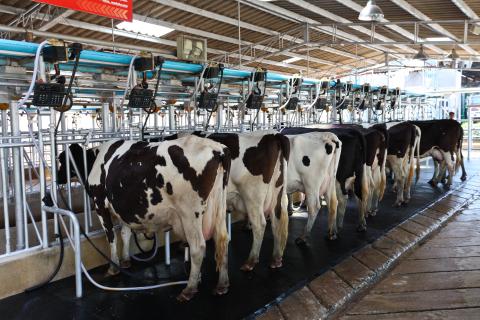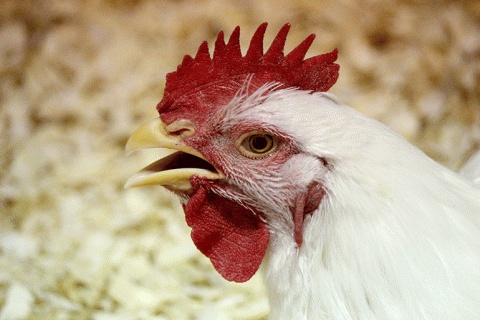Occupational Health: Farm Worker Health and Safety
For information on HPAI or H5N1, view our Avian Influenza information.
People who live or work with animals or animal products should be aware that even healthy animals (cattle, goats, sheep, pigs, chickens, turkeys) can pass on diseases (such as avian flu, E. coli, and Campylobacter) to humans. Diseases can also spread through manure/droppings, milk, and animal products like uncooked eggs or meat.
Children, pregnant women, the elderly and any person with a weakened immune system may be at an increased risk of getting sick or becoming severely ill.
People who do not have direct contact with animals, animal products, or manure/droppings have become infected when other people in their home inadvertently carried a disease into the home or vehicle on their hands, clothes or shoes.
The most common organisms that can be passed from animals to people include: Salmonella, Cryptosporidium, Campylobacter, E. coli, and Giardia.
Tips for people who live on a farm or work with animals or animal products
Always wash hands thoroughly with soap and water after you are done working with animals or animal products, handling equipment used on animals, or coming into contact with anything in the area where animals are present, including soiled surfaces and droppings.
- This is especially important to do before preparing or consuming food or drink for yourself or others.
- Adults should supervise hand washing for young children.
Use separate shoes, work gloves, and clothing when working with animals or animal products.
- Keep these items outside of your home, or remove or change immediately when arriving home, to prevent contamination of the home environment.
- Change or remove soiled clothing and boots before getting into vehicles.
- Wash hands after taking off any clothes and shoes you wore while working with animals or animal products.
Supervise small children during any animal encounter and discourage behaviors that can increase their risk of illness.
- Young children and people with weakened immune systems should avoid direct contact with calves, especially those with diarrhea (scours).
- Young children and people with weakened immune systems should avoid direct contact with poultry and freshly laid eggs when avian flu is in your area.
- Do not allow toys, pacifiers, spill-proof cups, baby bottles, strollers, or similar items in areas with animals or animal products.
Do not eat, drink, smoke, or chew gum in the areas where animals, animal products, or animal droppings are present.
Do not drink unpasteurized (raw) milk.
Work with your veterinarian to keep your animals healthy.
Get your annual flu vaccine, P-02272 (PDF). Although the flu shot can't prevent illnesses carried by animals, it can keep you from becoming sick with more than one illness at the same time.
Practice good biosecurity to help prevent the spread of diseases among people, your animals, and wildlife.
Carry a pocket card. If you do become ill with flu-like symptoms, diarrhea lasting more than a few days, or a high fever, notify your health care provider and tell them that you work with animals or their products. You can use this pocket card (PDF) to help you during your appointment.
Avian influenza information
Note: Resources listed below may be updated and revised. Check often for the latest information.
- DHS Avian Influenza webpage
- CDC Avian Influenza recommendations for:
- Fact sheets for farms:
- What Employers Should Know About Highly Pathogenic Avian Influenza (HPAI), P-03308 (multiple languages)
- What Workers Should Know About Highly Pathogenic Avian Influenza (HPAI), P-03308a (multiple languages)
- Fact sheets for dairy and meat processors: What Workers in Meat and Dairy Processing Should Know About Highly Pathogenic Avian Influenza (HPAI), P-03308b (multiple languages)
- Handout for dairy and farm workers from the Migrant Clinicians Network in English and Handout in Spanish
- OSHA Hazard Alert on H5N1 (Avian Influenza) in Dairy Cattle (PDF)
- National Center for Farmworker Health (NCFH) H5N1 materials for dairy workers. NCFH has worked with farmworkers directly to develop information for dairy workers. This includes social media messages, public service announcements, toolkits and other materials in English and Spanish.
Videos
- Short H5N1 videos from CDC for farm workers and others with occupational risk.
- U.S. Health and Human Services steps workers can take to prevent infection video in English (Video in Spanish)
- The University of Wisconsin’s dairy worker video series on antibiotic resistant bacteria has information that is also useful for protecting workers from avian influenza. Videos are available in English and Spanish. See Part 4 (Exposure to Germs at the Dairy), Part 5 (Personal Protective Equipment to Decrease Exposure), Part 6 (Washing Hands While Working at the Dairy).
- MSU Extension Dairy Team’s PPE recommendations for dairy workers during an H5N1 outbreak: PPE recommendations video in English, PPE recommendations video in Spanish.
More about farm worker health and safety
- Staying Healthy While Working on a Farm P-01711 (multiple languages)
- From Farm to City: Be Poison Safe (PDF) from Wisconsin Poison Center.
- Handwashing after Animal Contact P-01699 (multiple languages)
- Wash Your Hands! P-01710 (multiple languages)
- Heat illness prevention toolkit for agriculture (English and Spanish)
- Air Quality: Outdoor Health and Safety Recommendations, P-0344 (PDF)
- Upper Midwest Agricultural Safety and Health Center
- AgriSafe Network has information on agricultural occupational health and safety for ranchers and farmers, and health and safety professionals.
- DHS memo: Recommendations for COVID-19 Prevention and Mitigation Among Migrant and Seasonal Agricultural Workers (PDF)


